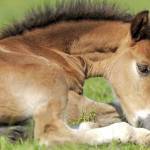Foals Dribbling Urine: Patent Urachus

The most frequent problems associated with the umbilical cords of foals are related to hygiene and hernia. Umbilical cords that are not properly attended to after birth, including appropriate use of a dipping disinfectant, are often the entryway for bacteria, which can lead to joint ill or body-wide infection. A less common, though just as grave, problem among foals is patent urachus, an anomaly that causes urine to leak from the umbilical stump.
The urachus is a conduit within the umbilical cord that carries urine from the bladder of the fetus to the fluid-filled sac that surrounds the unborn foal. In normal foals, the urachus closes at birth, stemming all future urine flow. In affected foals, however, urine continues to leak from the umbilicus. Urine may drip occasionally, dribble consistently or, in worst-case scenarios, stream freely. Misdirected urine can set the stage for bacterial infection, which may spread through the bloodstream and lead to life-threatening complications, such as joint infection and generalized septicemia.
Aside from urine leakage from the navel, other signs of patent urachus include enlargement of the navel and a constant wetness near the navel. Complications from this defect include urine scalding of the abdominal skin as well as the skin on the front aspects of the hind limbs, local dermatitis, and abscess formation.
Suspected cases of patent urachus should be evaluated by a veterinarian immediately. In addition to physical examination, a veterinarian will likely recommend ultrasound examination to ascertain communication between the urachus and the bladder and to establish the presence and extent of infection.
Once patent urachus is diagnosed definitively, a course of antibiotics is typically prescribed and treatment recommendations provided, which may include application of silver sulfadiazine salve on the navel and silver nitrate stick use to cauterize the opening. Surgery is sometimes suggested in advanced cases to remove the infected naval structures and to seal the opening between the urachus and bladder.
Because patent urachus normally affects young foals that are still being nourished primarily by their dams’ milk, there is little that can be done nutritionally, though some veterinarians might advise the use of vitamin E to bolster antioxidant defenses. In these instances, a water-soluble, natural-course vitamin E, such as Nano•E, is recommended.








